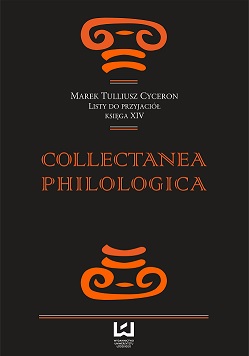Marek Tuliusz Cyceron, Listy do przyjaciół. Księga XIV
DOI:
https://doi.org/10.18778/1733-0319.2014.1Słowa kluczowe:
Cyceron, Marek Tulliusz Cyceron, Arpinata, listy Cycerona, „Listy do przyjaciół”, schyłek republiki rzymskiej, Pomponius Atticus, Pomponiusz Attyk, Lucjusz Sergiusz Katylina, Tullia, TerentiaAbstrakt
This publication presents the Polish translation of the fourteenth book of the Letters to his friends by Cicero (Epistulae ad Familiares), which contains 24 letters written during the years 58–47 BC. Our translation has been enriched with the large introduction, in which we pay attention to: historical background of the letters; the very character and history of Cicero himself (also as the very particular letter writer); and the recipients of his letters, among whom were the wife of Cicero, Terentia, a daughter Tullia and a son Mark. The readers will be able to learn what the structure and construction of the ancient letter looked like. We ourselves, while translating the text, have tried to interpret the Cicero’s words as literally as possible. This way the Polish readers can get to know this great orator from more private side – as a father and husband. His letters are far more private than any of his other work, as they were not intended to be published. They are full with emotions and sincerity, which show what man the author really was. Cicero was known as a confident person, even slightly arrogant, but while reading his letters we can see how in moments of doubt he shows his weakness and longing for loved ones. In the letters we can clearly see his relationship with children – the daughter Tullia and the son Mark. He seems to be a good father who spares no words of endearment for his kids. Fourteenth book of the letters also shows what the relation with his wife Terentia really looked like during the happy and the sad times. While the letters to his wife from the year 58 are filled with affection and sometimes bring to mind the modern love letters, it is clear that short after the year 47 BC they are more like telegraphic notes which contain rather orders or instructions regarding the care of children or the management of household. On the basis of this letters we are, at least partially, able to reconstruct the fate of the family of Cicero and the people closest to him like his best friend Pomponius Atticus. Unfortunately, we do not have any testimony of the letters which Terentia had been sending to her husband, so we must always take in mind to evaluate the relationship between both of them very carefully. Reading these letters is a wonderful adventure. The reader has the opportunity to get to know the daily life of Cicero, his private thoughts, attitudes towards loved ones, and it is all with the background of the historical events. No other ancient author have been so well known from the private side, so human side, a Cicero.Pobrania
Opublikowane
2014-01-01
Jak cytować
Kaczor, I., Kuszewska, K., Mrozek-Kochanek, K., Sygnet-Tomczak, H., Głogowska, K., Kielian, R., … Szafrańska-Sienkiewicz, M. (2014). Marek Tuliusz Cyceron, Listy do przyjaciół. Księga XIV. Collectanea Philologica, 50. https://doi.org/10.18778/1733-0319.2014.1
Numer
Dział
Other
Licencja

Utwór dostępny jest na licencji Creative Commons Uznanie autorstwa – Użycie niekomercyjne – Bez utworów zależnych 4.0 Międzynarodowe.












